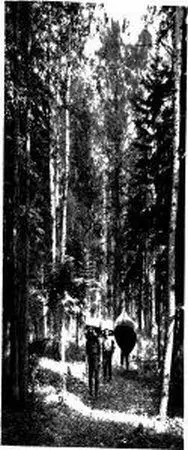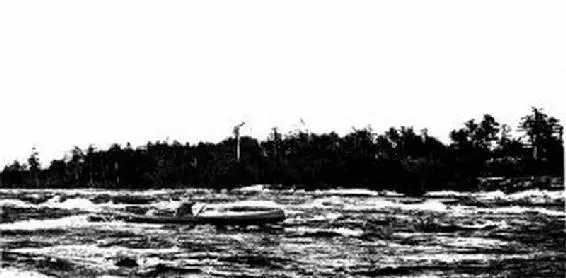A man, yes; but who? Frenchman? Indian? assuredly not the latter, his tracks would be unmistakable. A wandering fur-buyer? The Mounted Police? Surely they are not going to be narrow-minded about that little affair last spring at Bisco. The Prince of Wales? Maybe; they say he is in Canada just now.
Anyhow this has got to be investigated. You quicken your steps, and two hours later you smell smoke, and suddenly come on a blazing fire, with a tea pail suspended over it. It is only Old Bill from the Wild Cat Hills; but anyway, Bill is a good old plug, and is just back up from "Canada," and he may have some news, or a letter.
Bill has no letters and less news, but he has a few chocolate bars, priceless treasures, which he shares, and a new brand of tobacco that would asphyxiate a horse, which he also endeavours to share. We eat and talk awhile, then Bill, who draws his own toboggan, gathers up his belongings, ducks into his tump line, and slipping with deft ankle movements into the bridles of an immense pair of trail breakers, shoes of an Indian rig, waves his hand, and is away. For Bill turns off here; he is leaving the Wild Cat Hills, and is going, foot-loose and free, to some far range as yet unexplored.
And as I stand and watch him go, I am lonesome a little, for the thought strikes me that Bill is old and may not come back. And so, bending forward against the creaking leather, snow flying in little puffs from his big snowshoes, he goes. Leaving behind him as he proceeds that winding, ever-lengthening, narrow ribbon, the Trail, his one obsession for days to come, the only thing that connects him with his fellow-man, and one that the first storm will obliterate.
Down the hollow tunnels between snow-laden trees, over unmarked wastes, he picks his way by instinct; cynosure of all the hostile eyes that stare coldly out from shadowy recesses. Pushing doggedly on, across wind-lashed lakes, with their scurrying drift, and whirling, breath-taking snow-devils, past bald glistening mountains that stand guard at the portals of some mighty river. A moving speck, creeping across the face of the earth, he goes on to unknown destinations.
Day by day he penetrates deeper and deeper into the Kingdom of the Spirit of the North, where, jealous of such encroachment on his domain, with a thousand imps of mischief to do his bidding, master of all the powers of evil, the brooding Killer grimly bides his time; nor does he always wait in vain.
A small, red building overshadowed by a large canoe-shed, on the flat top of a rocky point; at the water's edge a dock at which float a number of canoes in various stages of loading. Men pass from the shed to the dock with bags of flour, sacks of beans, tents, blankets, boxes and bundles. In the shade of the wide-topped jackpines, a knot of townspeople watch the busy scene, their eyes turned often to the door of the little red building. The laden men, too, often glance that way; all present wear an air of expectancy.
Presently the canoes are all loaded, the shed closed, and the men dispose themselves to wait. Some of these are attired in new mackinaw or khaki, and knee-boots; others, to whom, it is obvious, the proceedings are no novelty, wear the faded canvas clothing and the moccasins, or other heelless footwear, of the professional canoeman.
Soon the door of the diminutive office opens, and there steps out from it a man, weather-beaten, lean and wiry as a greyhound, dynamic energy apparent in every movement, indomitable will stamped on every feature. He closes the building as though for a long time; for not once again during five months will any of these men return to this spot, unless dismissed the Service, for this is the official Head Quarters of the Government Forest Rangers, the wiry man their Chief.

The curse of Adam carried
out to the letter.
Seventy-five miles in is their distributing point, and from it these thirty men will successfully police from fire an area of ten thousand square miles. The Chief shoulders a heavy packsack, and steps quickly down to the dock with the lithe swing of an Indian. He glances appraisingly over his little band.
"Are we ready?" he asks.
It seems we are. He embarks in the rear canoe, for the trip ahead is long and arduous, and he must shepherd his men, unknown quantities many of them. Paddles are dipped, the veterans leading, and the flotilla is in motion. The bunched canoes string out, gain speed; the sun flashes on wet paddles, kneeling men sway to the stroke, and the canoes leap ahead in low undulations. The brigade is on its way, off on the Summer Trail.
The first objective is a long black point ahead, apparently the end of the lake. The point is reached, rounded, and another stretch of lake appears, with a similar point miles beyond. Hours of paddling, and no noticeable change in the scenery. A treadmill—but no stops.
Paddles, by pairs, click in unison with the regularity of clockwork; never a stroke is missed. Hours pass. The seasoned canoemen in front are setting a pace that never changes, never will change. They seem to have solved the problem of perpetual motion. The sun, a copper ball, burns its way across the sky, beating down on unshaded faces and bare forearms, and its reflected image on the glassy water stares into eyes puckered to mere slits against the scorching glare. The Chief, with his sternsman, a supple, slant-eyed Cree, brings up the rear, watching his men, estimating their efficiency. Some parts of his patrol are difficult, and he must place his rangers judiciously.

Running Big Pine Rapids.
Between two broken hills the lake narrows to a deep bay and finally comes to an end. Here a well-beaten, but not wide, path winds up a gully by carefully selected grades. Canoes are unloaded, and mountainous piles of baggage start up the ravine, as men assume their burdens and move off. This is the portage so long looked for as a change from the interminable paddling. And a change it certainly is. Everything, canoes and all, must be carried by man-power to the other side. Let us hope it is a short one. With our two hundred odd pounds apiece, by general consent conceded to be a "man's load," we commence the carry. An easy grade at first, but becoming rapidly more arduous as the two hundred and some pounds take their toll of nerve and muscle, with each successive upward step. Here the curse of Adam is fulfilled to the letter; sweat commences to pour into the eyes, down the body, dripping off the forearms. Vicious insects light and bite on contact. One hand is engaged in pulling forward and down on the top load to support the head, the other contains an axe or a pail of lard; so the flies stay until surfeited, and blood runs freely with the sweat. Up, and up, and then some. Surely this cannot go on much longer! But it does. Up on the crest, finally, where is a cool breeze; thank God for that; tear open the shirt and let it in.
Then down a declivity where the energy expended to keep from being rushed into uncontrollable speed, is apparently greater than the effort of climbing; the thought of a slip with that load is intolerable. Then a level spot, badly cluttered with boulders, and stones that move underfoot, where one walks with the precise steps of a cat, as a false step may mean a broken leg.
Men returning empty, carrying coiled tump lines, stand aside and give the trail to the burdened ones. No words are spoken on meeting; talking has become an effort, and the toilsome paddling of the forenoon now appears, by contrast, to have been little more than a light and healthful pastime.
Читать дальше














